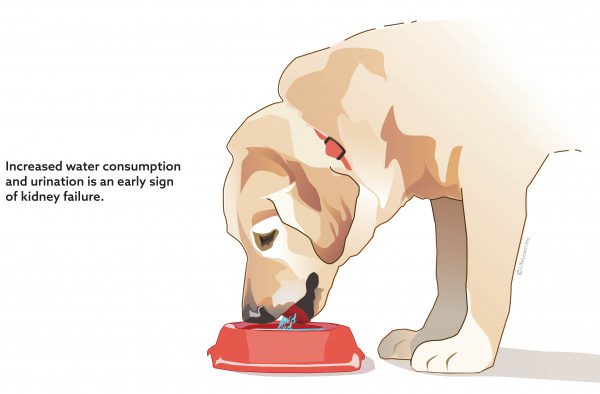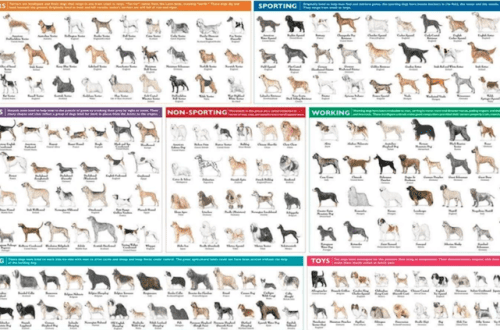
Kidney Failure in Dogs: Symptoms and Treatment
Kidney failure in dogs can seem like a scary diagnosis. But even if your veterinarian tells you that your beloved pet has kidney problems, which could lead to a diagnosis of kidney failure, don’t lose hope. Depending on the circumstances, this day may come very, very soon.
About how signs of kidney failure appear in dogs and how to treat this disease – later in the article.
Contents
Diagnosing Kidney Failure in Dogs
Kidney failure may result from other diseases that can affect the kidneys and related organs.
In this condition, the kidneys lose the ability to effectively perform their basic functions: filtering, excreting waste products, maintaining normal electrolyte balance, regulating hydration, and secreting hormones necessary for the production of red blood cells.
There are two forms of kidney failure in dogs:
- Acute kidney failure. It is characterized by a rapid impairment of kidney function – within a few hours or days – the process is called acute. Acute kidney failure in dogs is most often associated with infections and toxins.
- Chronic renal failure. Characterized by a gradual deterioration in kidney function—over weeks, months, or years—called chronic renal failure. The most common cause of chronic renal failure in dogs is the natural changes associated with age.
Changes in dogs in the kidneys begin in old age, but there are breeds in which the kidneys lose their ability to fully function much earlier than in others.
One of the most notable differences between acute and chronic renal failure is that the acute form is reversible with early and intensive treatment, while the chronic form can only be maintained.

Causes of kidney failure
This problem is ultimately caused by any disease that affects the kidneys. Among them:
- bacterial infections. For example, leptospirosis, which the Centers for Disease Control and Prevention says can be spread through drinking or bathing in contaminated water. This infection can lead to inflammation of the kidneys and subsequent destruction of kidney cells.
- Toxic effects or poisoning of the kidneys. It causes damage to kidney cells. This happens when the dog is on medication or when poisons such as antifreeze or grapes are ingested. The ASPCA Animal Poison Control Center has included these and other household items on its list of foods to keep out of your dog’s reach.
- Congenital pathologies. Hereditary diseases can lead to impaired renal function. The Merck Veterinary Manual lists such hereditary diseases, ranging from cysts to agenesis, the congenital absence of one or both kidneys.
- Geriatric changes. As the kidneys age, their cells can break down and die. This is by far the most common cause of kidney disease in dogs.
Kidney Failure in Dogs: Symptoms
The most common signs of the disease:
- Vomiting.
- Frequent drinking and urination.
- Lethargy.
- Weight loss.
- Pale mucous membranes.
The severity of clinical signs associated with kidney disease may vary depending on whether the manifestation is acute or chronic. The degree of progression of impaired renal function and its underlying causes also matter. A veterinarian can determine if these signs indicate a kidney problem or another, such as diabetes.
How to Treat Kidney Failure in Dogs
How kidney failure is treated depends on the underlying cause and the general condition of the patient. Dogs with severe acute renal failure may require hospitalization and intensive care to recover. In milder cases, antibiotic therapy, infusion and other drugs that can be taken on an outpatient basis give a good result. For those rare lucky ones whose owners can afford expensive treatment, the option of dialysis is available.
Treatment of Chronic Renal Failure in Dogs
In the case of a chronic manifestation of the disease, treatment is usually aimed at slowing its progression and improving the dog’s quality of life. Usually, treatment is aimed at relieving symptoms of anemia, high blood pressure, electrolyte disturbances, fluid imbalances, vomiting, and changes in appetite. Most of these symptoms can be managed with diet and medication. Sometimes pets can maintain a high quality of life for many years after being diagnosed with kidney failure.

Prevention of kidney failure
Chronic renal failure in dogs is most often the result of age-related changes, so it cannot be prevented. But regular clinical exams and health screenings can increase a dog’s chances of early diagnosis and treatment.
Acute kidney failure is preventable in many cases. Vaccination against infectious diseases such as leptospirosis can be very effective. It is important to remove any toxic substances from the home, such as antifreeze, be careful with grapes and raisins, and keep all medications out of the reach of dogs.
Renal failure in dogs: life prognosis
The duration of kidney degeneration will be associated in a pet with a genetic predisposition. Chronic renal failure in dogs is programmed to occur at a certain age, but there is no data on the predisposition of specific breeds.
But some kidney diseases that can lead to kidney failure are disproportionately common among certain breeds. These include:
- Basenji. They are particularly susceptible to Fanconi’s syndrome associated with impaired absorption of electrolytes.
- Bernese Mountain Dogs. These dogs may have a congenital kidney disease called glomerulonephritis.
- Collies, Shelties and German Shepherds. These breeds are prone to lupus, an autoimmune disease that affects the kidneys and other organs.
- Sharpei. They can suffer from hereditary amyloidosis of the kidneys.
It is difficult to predict in advance which dogs will develop these diseases. However, modern blood tests help detect kidney disease in dogs and cats at an early stage, sometimes even years before symptoms appear.
For example, recently the analysis of SDMA – “symmetrical dimethylarginine”, a genetic marker of kidney function, has been very popular. Many veterinarians use this analysis as part of their annual examination. Therefore, it is important to check with the veterinarian whether the dog can take this test at the next visit.
The role of nutrition in kidney failure
Nutrition has long been the mainstay of treatment for this disease in dogs. Because maintaining electrolyte balance and managing blood proteins is an important part of kidney function, changing the nutrients in your dog’s diet can make it easier for them to function.
All owners of dogs whose pets have kidney disease should talk to a veterinarian about the most effective diet and any additional nutritional supplements their dog may need.
Today, there are more options for treating kidney failure in pets than ever before. With advances in nutrition and veterinary medicine, the life expectancy of animals with kidney disease is definitely increasing. Proper veterinary care is sure to help your dog live a long life.





